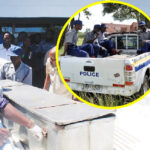Harare – Vice-President Constantino Chiwenga, a figure synonymous with the 2017 ousting of the late President Robert Mugabe, is increasingly making headlines not just for his political role, but for his colourful and impactful use of language. His public statements, often rich in vernacular, have resonated with Zimbabweans, taking social media by storm and shaping the national discourse.
At the mention of his name, many rush to think of the man who played a critical role in deposing the late former President Robert Mugabe, a feared and respected Statesman, who brooked no nonsense. Even international leaders feared and revered Mugabe one way or the other. But when the time came, Mugabe was toppled in a military coup in November 2017, marking an end to his near-four-decade rule. A fearless former army general, who in the build-up to the coup, foiled a swarm of police details waiting to arrest him at Robert Gabriel Mugabe International Airport in Harare upon his return from China. That is Vice-President Constantino Chiwenga.
Today, despite holding the second most powerful office in the country, Chiwenga has shown his other side, perhaps as a sharp orator whose public statements have found favour among netizens and the general populace. Rich in vernacular, his statements have taken over social media by storm, with his utterances shaping the society in some way.
Zvigananda was a term used during the war of liberation to refer to people, who would take advantage of the chaos and move around accumulating wealth through illegal means.
“Zimbabwe belongs to all of us. We must share its God-given bounty, share its bounty equally so no one — not even the weak, the widowed or the orphaned — are displaced or elbowed out by the strong in a mad rat-race to grab unmerited privileges. Corruption has to end,” Chiwenga said. “Our Vision 2030 is for all of us, not those that you call mbinga. During the war, we referred to them as zvigananda (leeches): those who grow big tummies through ill-gotten wealth and questionable morals! Pasi nezvigananda [Down with leeches].”
Today, Zimbabweans have been using the word zvigananda to describe people involved in corrupt ways as well as people with huge frames. The “Pasi nezvigananda” statement has taken on a life of its own, resonating with Zimbabweans both online and offline.
“VP Chiwenga is using statements that reflect and are in sync with the political, economic, and social climate in the country,” said political analyst and media expert Lazarus Sauti. “Corruption is rife and devouring development in Zimbabwe, and he [Chiwenga] castigated it using the word zvigananda. The word is now part of our social discourse.”
Following the introduction of the Zimbabwe gold-backed local currency, ZiG, last year, Chiwenga took to the podium to reprimand illegal forex dealers and urged them to desist from such operations as they sabotage the economy. In vernacular, Chiwenga delivered his message like: “Regerai vakomana. Hatidi kuti ukanganiswe uzoita hupenyu waremara, handiti. Regerai, ndati chii? [Stop it. We don’t want you to be crippled, do you hear me. Stop it, what did I say].”
The statement has also taken the social media by storm, with netizens using it to reprimand colleagues to desist from wayward behaviour. For example, the statement has been popular among men reprimanding each other from infidelity or from unprotected sex. In bars, imbibers utter “regerai vakomana munoremara” to reprimand those who abuse liquor or consume illicit brews.
“VP Chiwenga also used the phrase ‘regerai vakomana munokuwara’ in castigating illegal activities in the country,” Sauti added. “The phrase is now like a national anthem on social media platforms in Zimbabwe. This shows the power of words and phrases in meaning-making. Words are powerful in politics. They shape opinions, frame issues and create identities.”
The phrases Regerai vakomana munoremara and Pasi nezvigananda have become ingrained in popular culture, symbolising a sense of frustration and disillusionment with the status quo. These phrases are not only being shared and discussed on social media platforms, but are also being used in everyday conversations, reflecting the growing discontent among citizens. The fact that these phrases have become so popular is a testament to the power of social media in amplifying voices and mobilising public opinion.
Addressing a rally ahead of the August 2023 elections in the Midlands province, Chiwenga once likened the opposition party, Citizens Coalition for Change (CCC), to lice. “I have heard others here saying down with CCC, let me assure you that there is nothing that it can achieve,” Chiwenga said. “You see how we crush lice with a stone,” Chiwenga added, “you put it on a flat stone and then flatten it to the extent that even flies will not make a meal out of it.”
Media expert and researcher Mlondolozi Ndlovu said Chiwenga’s speeches depict that of a person who went to war and trained as a commissariat. “Chiwenga belongs to the nationalistic movement, the old crop of nationalists,” Ndlovu said. “Though a military man, he was trained as a commissar during the war and much of his language is very consistent with the discourses of the war.”











